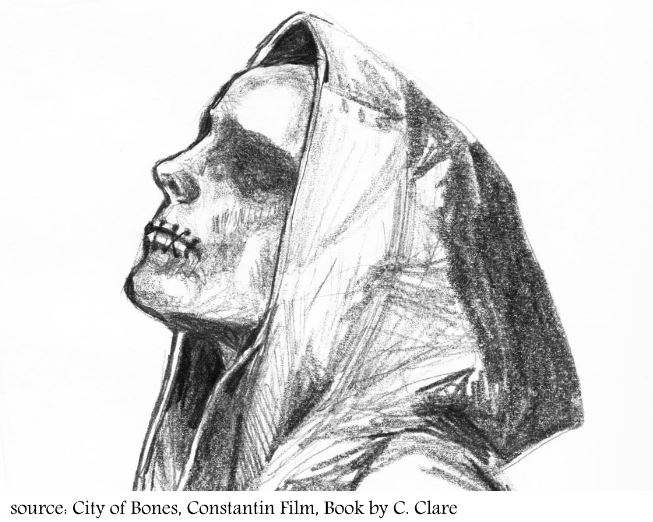He began as a wand...
A truly beloved wand...Ash stepped out in front of the gates, presenting an easy ground-level target to the attacking force. At this enticement, the angered kobolds did launch a ground assault, untethering the giant boars from the wagons and driving the creatures charging towards the draw-bridge. Ash unleashed a lightning bolt of his own using a wand, severely injuring the ten huge beasts...
The negotiations, if they could be called that, continued for a minute or two, until Ash noticed a bugbear creeping up the passage behind himself and the others. Two quick blasts of lightning from Ash’s wand ended both the conversation and the would-be bugbear ambusher.
That was used constantly...
They were ambushed by another bugbear while they sat in the main hall pondering over the magical rings, and another when they exited into the right-most side passage. Both were dispatched quickly through the liberal application of lightning bolts.
. . .
As the kobolds stood deaf, dazed, and blind from the sudden detonation of a lightning bolt an otherwise pitch-dark, enclosed space (something the party had gotten used to by this point), the party rushed past them into the next corridor...
And I do mean, Constantly...
Ash once again did not hesitate to unleash a lightning bolt, which bounced wildly around the small room, searing filth and worm-beast alike, while somehow not touching the party.
. . .
Ash was frozen from the waist down, barely able to breathe, and could feel the hypothermia setting in as the spider thing closed in, drawing a blade for the kill. With frost-bitten fingers, Ash weakly raised the point of his wand and, through chattering teeth said what he thought would be his last words…“Lightningbolt!”
-- The Third Party: Session 10The elven wizard Ash used his wand of lightning again, and again, and again. He blew through all of its charges. Recharged it. Used them all again. Recharged. Used them all again.
Then...it broke...and out came...
 |
| ZORCH! |
Lightning mephits instantly regenerate all damage on contact with an electrical source, such as another mephit’s lightning bolt. This reinforces the mephit’s natural desire to congregate with others of its kind. A force of mephits that can recharge one another is unstoppable by anything short of a glass of water.
By virtue of his electrified nature and ability to regenerate, Zorch has served the party as a PMD. He is always the first to fly into any situation, counting on Ash's lightning bolt spells to restore him no matter how troublesome the traps or ambushes he triggers (short of a glass of water).
As soon as the brilliantly glowing mephit stuck its head aboveground, a squadron of gnolls who had been searching the ruins charged the hole Ash had opened, with nine of the creatures baring down on them, and one breaking off and running the other way (whether for reinforcements or because gnolls are notoriously unreliable is hard to say). Ash threw off the lid and dropped down the shaft. The party arrayed themselves in the many side-passages and waited.
. . .
Mel dropped down the narrow shaft behind the mephit, finding nothing but a trace of ash smeared on the damp, bare-earthen walls of the tunnel. A discharge from her ring of shocking grasp was sufficient to revive the creature, however. As the light brightened from the reconstituting lightning mephit, Mel noticed a grim, gray, silent humanoid figure standing immediately behind where the mephit was manifesting.Over time, Ash began sacrificing a portion of his experience to level up the Mephit, eventually allowing it to gain levels as...A BARD!
Zorch unleashed a string of vicious mockery at the blonde woman, but the magic contained in his words were similarly negated. There was a flash from the crowns and Kevorkian, Zorch, and Dame full felt the weight of Zorch's belittling statements, feeling suddenly very weak.
With her sisters still standing around looking very confused, the blonde woman then retaliated for the outrage, releasing a flare of brilliant white light. Everyone was scorched, Zorch so much that he discorporated again...
The immortal and instantly-regenerable nature of Zorch is such that he has come back even from being devoured entirely by various soul-sucking devices and monstrosities.
Of course the sarcophagus was not empty and the occupant, the petrified remains of a squat, wide man in ornate, petrified, leather armor and a large warmask. Ash sent Zorch to grab the thing, only to have Zorch sucked--soul, body, and all--into the thing's maw.
. . .
Ash sent Zorch to examine the stone urn on its pedestal, only to have the mephit sucked bodily into the thing when he touched it. Grimnir stepped up and cast identify on the urn, learning that it was a device that consumed souls to fuel a kind of perpetual prison for purpose of preserving the soul of whoever was last interred within the vessel, keeping the soul within the earthly realms and delaying their journey to whatever heavenly or infernal enternity awaits them.The Urn, it turned out, was almost Zorch's true undoing, especially when it was almost destroyed.
The guard did finally react when Ash tried to scoop up some of the water of the Pool using his soul-sucking urn. As soon as the urn crossed the line of the guards, a sword came up, impossibly fast, shattering the urn. Ash scooped the pieces, weeping for the possible loss of Zorch. Ash, not wanting to take any more chances with the receptacle that held Zorch's soul/body/form/whatever, considered blasting the Urn with lightning to see if he could resurrect Zorch again.Not even the soul-trapping urn could really stop this physical embodiment of lightning.
Ash, meanwhile, sensing the tremendous power possessed by the Pool of Radiance, took his urn with him and dove in. There was a flash of light the blinded everyone as energy surged into Ash as the soul-devouring power of the urn mingled with the absolute law of the Pool. With supreme focus of will, Ash harnessed and shaped the inflow of power before it could destroy him.
The urn began to disintegrate. Ash cried out, focusing the last of the dissipating energies back into the urn and unleashing a bolt of lightning. Then the urn was gone. A moment later, as Ash climbed out of the Pool, he felt a jolt and a tap on the shoulder. He turned to find Zorch floating there.
Ash and Zorch had their tearful reunion...Of course, not even Zorch could survive contact with the Pool of Radiance unscathed... This final resurrection brought Zorch back as a Radiance Mephit.
 |
| WITH PALADIN LEVELS! |
Zorch: Radiance Mephit, Bard 5th / Paladin 5th
_____________________________________________________________________Special thanks to +Paul King for taking this crazy character (and magic item) and running with them.













